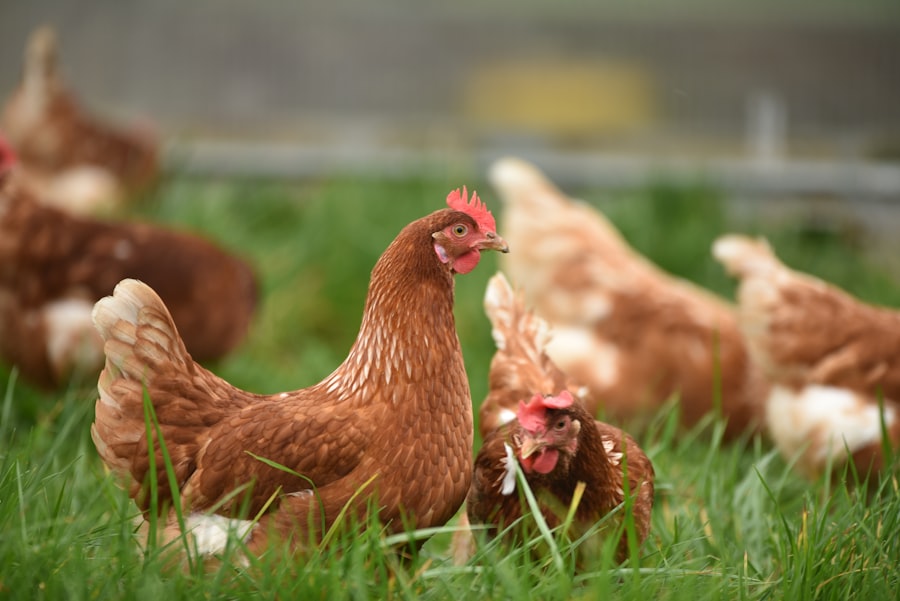Keeping chickens in your backyard has become a growing trend in recent years. Many people are drawn to the idea of having fresh eggs and the satisfaction of knowing where their food comes from. However, before you jump on the chicken-keeping bandwagon, it’s important to know the regulations in your area. In Thousand Oaks, CA, the question of whether you can keep chickens is a common one.
Key Takeaways
- Chickens can be kept in Thousand Oaks, CA, but there are zoning regulations to follow.
- Raising chickens in your backyard can provide benefits such as fresh eggs and natural pest control.
- Choosing the right breed of chicken for your climate and needs is important for their health and productivity.
- Building a chicken coop is important for the safety and comfort of your flock.
- Maintaining your chicken coop involves cleaning, feeding, and taking care of your chickens regularly.
Zoning Regulations for Keeping Chickens in Thousand Oaks
In Thousand Oaks, there are specific zoning regulations that dictate whether or not you can keep chickens on your property. According to the city’s Municipal Code, residents are allowed to keep up to four hens per household. Roosters, on the other hand, are not permitted due to noise concerns.
If you are interested in keeping chickens in Thousand Oaks, you will need to obtain a permit from the city. The permit process involves filling out an application and paying a fee. The city will then review your application and inspect your property to ensure that it meets the necessary requirements for keeping chickens.
Understanding the Benefits of Raising Chickens in Your Backyard
There are numerous benefits to raising chickens in your backyard. One of the most obvious benefits is having a constant supply of fresh eggs. Not only do backyard eggs taste better than store-bought eggs, but they are also more nutritious. Chickens that are allowed to roam and forage for their food produce eggs that are higher in omega-3 fatty acids and vitamins A and E.
In addition to fresh eggs, raising chickens also provides a source of natural fertilizer for your garden. Chicken manure is rich in nitrogen, phosphorus, and potassium, which are essential nutrients for plant growth. By composting chicken manure and using it in your garden, you can improve soil fertility and reduce the need for chemical fertilizers.
Another benefit of backyard chicken keeping is the positive impact it can have on the environment. Chickens are natural pest controllers, as they eat insects and other pests that can damage your garden. By allowing chickens to roam freely in your backyard, you can reduce the need for chemical pesticides and promote a more sustainable approach to gardening.
Furthermore, raising chickens in your backyard can be a valuable educational experience for children. It teaches them about responsibility, compassion, and the importance of sustainable living. Children can learn about the life cycle of chickens, how to care for them, and the importance of treating animals with kindness and respect.
Choosing the Right Breed of Chicken for Your Climate and Needs
When it comes to choosing the right breed of chicken for your backyard, there are several factors to consider. One of the most important factors is climate. Different breeds of chickens have different temperature tolerances, so it’s important to choose a breed that is suitable for the climate in Thousand Oaks.
Some breeds, such as Rhode Island Reds and Plymouth Rocks, are known for their cold hardiness and can tolerate colder temperatures. Other breeds, such as Leghorns and Sussex, are better suited for warmer climates. It’s important to research different breeds and their specific temperature tolerances before making a decision.
In addition to climate, you should also consider your needs and preferences when choosing a breed. Some breeds are known for their egg-laying abilities, while others are prized for their meat quality. If you are primarily interested in eggs, breeds such as Australorps and Orpingtons are known for their high egg production. If you are interested in both eggs and meat, dual-purpose breeds such as Barred Rocks and Wyandottes may be a good choice.
Building a Chicken Coop: Why It’s Important and What to Consider
Building a chicken coop is an essential part of backyard chicken keeping. A chicken coop provides shelter and protection for your flock, keeping them safe from predators and the elements. It also provides a designated space for your chickens to lay their eggs and roost at night.
When building a chicken coop, there are several factors to consider. One of the most important factors is size. The size of your coop will depend on the number of chickens you plan to keep. As a general rule of thumb, each chicken should have at least 4 square feet of indoor space and 10 square feet of outdoor space.
Location is another important consideration when building a chicken coop. The coop should be located in an area that is well-drained and receives plenty of sunlight. It should also be easily accessible for cleaning and maintenance.
Predator-proofing your coop is also crucial. Chickens are vulnerable to predators such as raccoons, foxes, and coyotes. To protect your flock, make sure your coop has secure fencing and a sturdy roof. You should also consider burying hardware cloth around the perimeter of the coop to prevent predators from digging under.
Designing Your Chicken Coop: Tips and Ideas for a Safe and Comfortable Home

When designing your chicken coop, there are several tips and ideas to keep in mind to ensure a safe and comfortable home for your flock. Ventilation is one of the most important considerations. Good ventilation helps to regulate temperature and humidity levels inside the coop, preventing the buildup of ammonia fumes from chicken waste.
To provide adequate ventilation, consider installing windows or vents in your coop. These can be covered with wire mesh to keep out predators while allowing for airflow. You should also make sure that the windows or vents can be opened and closed to adjust ventilation as needed.
Lighting is another important aspect of coop design. Chickens need natural light to lay eggs, so it’s important to provide windows or skylights in your coop to allow for natural daylight. You can also install artificial lighting to supplement natural light during the winter months when daylight hours are shorter.
When it comes to bedding materials, there are several options to choose from. Straw, wood shavings, and pine needles are all commonly used bedding materials for chicken coops. It’s important to choose a bedding material that is absorbent and easy to clean. The bedding should be changed regularly to maintain a clean and healthy environment for your chickens.
Materials and Tools Needed for Building a Chicken Coop in Thousand Oaks
To build a chicken coop in Thousand Oaks, you will need a variety of materials and tools. Some of the materials you will need include lumber for framing, plywood for walls and flooring, wire mesh for windows and fencing, roofing material, and hardware such as screws and nails.
In terms of tools, you will need a saw for cutting lumber, a drill for making holes and attaching hardware, a hammer for driving nails, and a tape measure for taking measurements. You may also need additional tools such as a level, a square, and a staple gun.
You can purchase the necessary materials and tools from local home improvement stores or online retailers. It’s important to choose high-quality materials that are durable and weather-resistant to ensure the longevity of your coop.
Step-by-Step Guide to Building a Chicken Coop in Thousand Oaks
Building a chicken coop can be a fun and rewarding DIY project. Here is a step-by-step guide to help you get started:
1. Plan your coop: Before you start building, it’s important to have a clear plan in mind. Consider the size of your flock, the layout of your property, and any specific needs or preferences you have for your coop.
2. Gather materials and tools: Once you have a plan in place, gather all the necessary materials and tools. Make sure you have everything you need before you start building.
3. Build the frame: Start by building the frame of your coop. Use the lumber to construct the walls, floor, and roof. Make sure the frame is sturdy and level.
4. Install windows and vents: Once the frame is complete, install windows or vents to provide ventilation. Cover them with wire mesh to keep out predators.
5. Add walls and roofing: Attach plywood or other suitable material to the frame to create walls and a roof. Make sure the walls are secure and weatherproof.
6. Install doors and nesting boxes: Install doors for easy access to the coop and nesting boxes for your chickens to lay their eggs. Make sure the doors are secure and can be locked at night.
7. Predator-proof the coop: Install wire mesh fencing around the perimeter of the coop to prevent predators from getting in. Bury hardware cloth around the perimeter to prevent predators from digging under.
8. Add bedding and perches: Once the coop is complete, add bedding material such as straw or wood shavings to create a comfortable environment for your chickens. Install perches for your chickens to roost on at night.
9. Test the coop: Before introducing your chickens to the coop, test it to make sure everything is working properly. Check for any gaps or openings that could allow predators to enter.
10. Introduce your chickens: Once you are satisfied with the coop, introduce your chickens to their new home. Monitor them closely in the beginning to ensure they are adjusting well.
Maintaining Your Chicken Coop: Cleaning, Feeding, and Taking Care of Your Flock
Maintaining a clean and healthy chicken coop is essential for the well-being of your flock. Regular cleaning helps to prevent the buildup of bacteria and parasites that can cause disease. It also helps to keep your chickens comfortable and happy.
Cleaning your coop involves removing soiled bedding, replacing it with fresh bedding, and scrubbing any dirty surfaces. You should also regularly clean and refill your chickens’ water and food containers to ensure they have access to clean water and a balanced diet.
Feeding your flock a balanced diet is also important for their health and productivity. Chickens require a diet that is high in protein, vitamins, and minerals. You can provide them with commercial chicken feed or supplement their diet with kitchen scraps, fruits, vegetables, and grains.
In addition to cleaning and feeding, it’s important to regularly check on your flock and monitor their health. Look for any signs of illness or injury, such as lethargy, loss of appetite, or abnormal behavior. If you notice any signs of illness, it’s important to seek veterinary care as soon as possible.
Enjoying the Rewards of Raising Chickens in Thousand Oaks, CA.
Keeping chickens in your backyard can be a rewarding and fulfilling experience. Not only do you get to enjoy fresh eggs and the satisfaction of knowing where your food comes from, but you also have the opportunity to teach your children about responsibility and sustainable living.
While there are regulations and considerations to keep in mind when keeping chickens in Thousand Oaks, the benefits far outweigh the challenges. By following the zoning regulations, choosing the right breed of chicken, building a safe and comfortable coop, and maintaining a clean and healthy environment for your flock, you can enjoy all the rewards that come with backyard chicken keeping. So why not consider keeping chickens in Thousand Oaks? You won’t regret it!
If you’re interested in keeping chickens in Thousand Oaks, CA, you may also want to check out this informative article on the Poultry Wizard website about the Hannah Montana Chicken Coop. This article provides valuable insights into designing and building a chicken coop that is not only functional but also aesthetically pleasing. With detailed instructions and helpful tips, it’s a great resource for anyone looking to create a stylish and practical home for their feathered friends. Read more here.
FAQs
Can I keep chickens in Thousand Oaks, CA?
Yes, you can keep chickens in Thousand Oaks, CA, but there are certain regulations and guidelines that you need to follow.
What are the regulations for keeping chickens in Thousand Oaks, CA?
According to the city’s municipal code, residents are allowed to keep up to six chickens on their property, as long as they are kept in a secure coop or enclosure and are not allowed to roam freely.
Do I need a permit to keep chickens in Thousand Oaks, CA?
No, you do not need a permit to keep chickens in Thousand Oaks, CA, as long as you follow the regulations set forth by the city.
What kind of coop or enclosure do I need for my chickens?
Your coop or enclosure must be secure and provide adequate space for your chickens to move around and roost. It should also be easy to clean and protect your chickens from predators.
What kind of feed do I need for my chickens?
Chickens require a balanced diet that includes a mix of grains, protein, and vitamins. You can purchase chicken feed at most pet stores or feed supply stores.
Do I need to clean my chicken coop regularly?
Yes, it is important to clean your chicken coop regularly to prevent the buildup of bacteria and disease. You should also replace the bedding and nesting material on a regular basis.
Can I sell eggs from my chickens?
Yes, you can sell eggs from your chickens, but you must comply with any applicable health and safety regulations. It is also important to ensure that your chickens are healthy and well-cared for.
Meet Walter, the feathered-friend fanatic of Florida! Nestled in the sunshine state, Walter struts through life with his feathered companions, clucking his way to happiness. With a coop that’s fancier than a five-star hotel, he’s the Don Juan of the chicken world. When he’s not teaching his hens to do the cha-cha, you’ll find him in a heated debate with his prized rooster, Sir Clucks-a-Lot. Walter’s poultry passion is no yolk; he’s the sunny-side-up guy you never knew you needed in your flock of friends!







